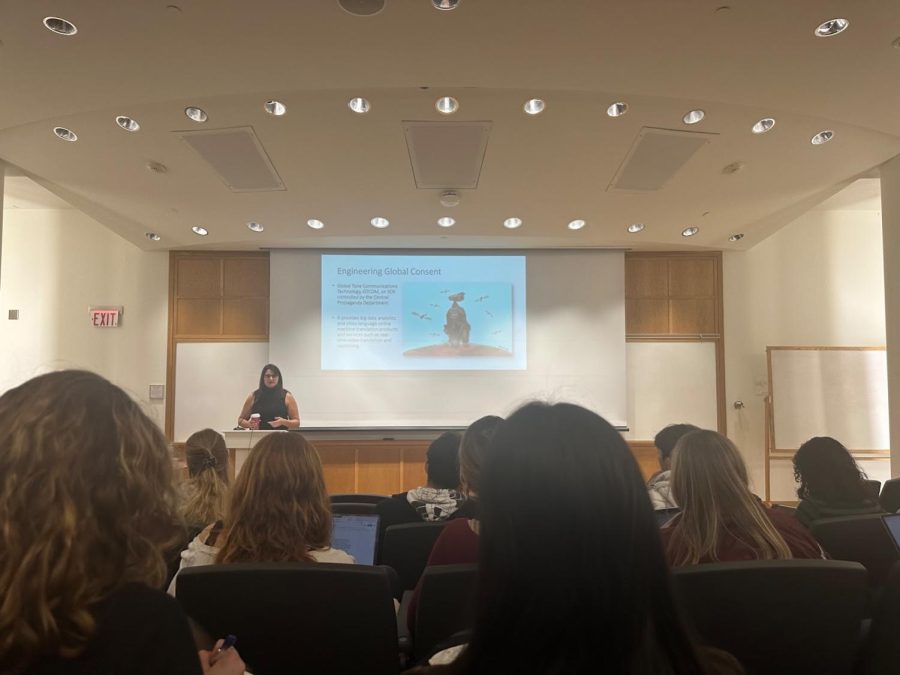Lampert Institute Hosts Lecture on Tech-Enhanced Authoritarianism in China
The Lampert Institute for Civic and Global Affairs welcomed Samantha Hoffman for a guest lecture on the “Global Outreach of China’s Tech-Enhanced Authoritarianism” on Tuesday, Feb. 21 in Persson Auditorium. Samantha Hoffman is a senior analyst at the Australian Strategic Policy Institute and director at ANS Analytics LLC.
Illan Nam, associate professor of political science and director of the Lampert Institute helped to organize this event and introduced Hoffman. Nam explained that Hoffman’s work is especially prevalent given current events.
“Dr. Hoffman has published numerous articles on the Chinese Communist Party and its use of technology to enhance its authoritarian powers. This is a topic garnering great public attention,” Nam said.
Hoffman drew attention to several issues during her lecture including how the Chinese Communist party gathers large amounts of data from users around the world and uses the data to develop artificial intelligence and voice/facial recognition technologies. In her presentation, Hoffman described the ways in which a party can rely on technology to survey and control others as a method of maintaining power effectively.
“Rather than creating fundamentally new ways of controlling populations, technology augments the party’s long-standing methods of exercising authoritarian dominance,” Hoffman explained.
Hoffman explained the kind of technology that is used and how systems involving constant surveillance and data generation technologies may be used as tools for the state. When referring to the technologies, Hoffman explained the implications this has on overall society.
“It is not limited to intrusive surveillance technologies, and also includes the human rights and national security risks they create,” Hoffman said.
Hoffman emphasized the use of data-generating technologies that are used to strengthen authoritarianism in China.
“When aggregated, data that may seem insignificant in isolation can have enormous strategic value,” Hoffman said. “Limited by the intent of an actor who has access to, or possession, of the data.”
China is not the only country that uses such technology. Hoffman mentioned that even democratic states, like the U.S., also use these products, however, it is the “intent behind products” that enhances authoritarianism.
Nam explained that the event was a success and that students seemed to be engaged during the Q&A session after Hoffman’s lecture.
“The turnout was very good, and I was pleased by our Q&A session. Students seemed very attentive to the importance of learning more about this issue and asked excellent questions,” Nam said.
Nam also emphasized the importance of students learning about this specific topic, as it connects to everyday life.
“As users of technology, students themselves create a lot of data that, in the aggregate, is valuable to firms and states,” Nam said. “It is important to understand better the potential consequences—both beneficial and detrimental—that our collective use of these technologies may generate.”
Sophomore Grace Helm attended the event and learned about how technology can be used to strengthen authoritarian power.
“Our professor told us about [the event] because Dr. Hoffman is pretty world-renowned, so she suggested we come to it. She got pretty far into some technical details and some stuff where she lost me, but I think the general idea of China’s technological advancements is very topical at this moment and I think it’s always really important to be informed about those kinds of things,” Helm said.
Nam explained that Dr. Hoffman appeared to be pleased with the event as well, especially after the question and answer section in which she interacted with students.
“I think she was delighted and impressed by the intelligent and probing questions Colgate students posed,” Nam said.
The Institute hosted a dinner for Dr. Hoffman after the lecture which was attended by Lampert Scholars as well as other faculty members, including Nam, where they were able to further discuss the topics and issues Hoffman raised during the talk.

Ellie Weber is a junior from New York, NY concentrating in political science. She has previously served as a staff writer for the News section. On campus,...







